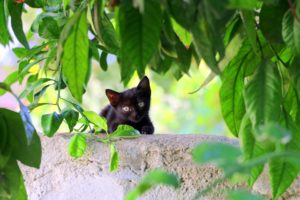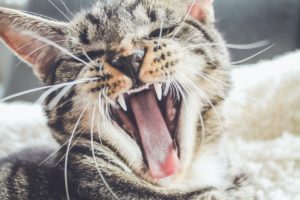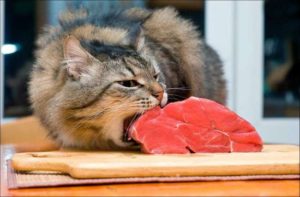There’s No Such Thing As a Vegan Cat

There’s no lack of interest in nutrition and diets both for people and pets. In fact, due to numerous deadly pet food recalls and consumers educating themselves about quality nutrition, more pet parents are paying attention to what they feed their pets. I also notice more and more people adopting vegan and vegetarian diets for themselves, many for ethical reasons. I was recently asked what I thought about vegetarian organic food for pets. Despite whatever personal beliefs you hold regarding vegetarian and vegan diets, please remember that cats are carnivores. For this reason, a vegetarian or vegan diet for cats is truly the worst thing you can feed. Let’s take a closer look at why.
Reasons why vegan diets don’t work for cats
There are a number of reasons why cats shouldn’t eat a plant based diet, but perhaps the most fundamental is physiological: they are obligate carnivores. This means that they must eat meat to survive, and this is due to the complete amino acid profile that meat contains. Cats’ bodies simply don’t have the ability to convert plant proteins into the amino acids they need. Plants also do not contain taurine, and cats must get this amino acid from their diet. Taurine is found in muscle meat, heart and liver. Without taurine the cat will develop cardiovascular disease and blindness.
Another reason why plant-based diets are not suitable for cats has to do with how plants affect metabolism and digestion. Eating a vegetarian or vegan diet involves carbohydrates. Cats simply don’t make enough amylase needed to break down carbohydrates. Feeding a diet high in plant-based ingredients will also lead to digestive upsets and inflammation. Furthermore, it raises the cat’s pH of the urine making it more alkaline. The more alkaline the urine is the greater chance of developing struvite crystals or stones in the bladder, an extremely painful and life-threatening condition.
Biology opposes a vegan diet for cats
Biological design also proves meat-based diets are best for cats. First of all, take a look at their teeth and jaws. Like their wild cousins, cats have sharp canine teeth designed to rip and shred flesh, not grind their food. In fact, there’s very little chewing involved at all. Have you noticed how your cat gulps down her food?
Secondly, cats’ bodies are biologically designed with short, tube-like digestive tracts. In addition, their stomachs are highly acidic which are necessary for digesting proteins. Interestingly, they do not have the ability to break down cellulose and starch, found in plants. This is why you may notice vegetables in the food pass through the digestive tract and end up in poop undigested.
Despite the fact that commercially made vegetarian cat food may contain synthetic vitamins and supplements, these laboratory-produced ingredients are not as easily absorbed and put to use in the body. This can leave a cat nutritionally deficient, leading to health complications.
Other dietary deficiencies in vegan diets for cats
Vegan diets are also deficient in essential fatty acids, Vitamin D and quality protein, according to Dr. Karen Becker, DVM.
Cats don’t make vitamin D in their skin from sunlight, so it also needs to come from their diet. The vitamin D needs to be vitamin D3 (which comes from animal sources), not vitamin D2 (which comes from plant-based sources).
Cats lack the enzymes necessary to convert vegetable sources of omega-3 essential fatty acids alpha-linolenic acid (ALA) into adequate amounts of docosahexaenoic acid (DHA) and eicosapentaenoic acid (EPA). A deficiency in both DHA and EPA leads to a number of inflammatory and degenerative issues down the line.
The quality of protein you feed [your) cat is also very important. We know that high-quality flesh meats are easier for pets to digest, absorb, and use properly. I strongly advise people to avoid non-meat sources of protein for carnivores, including soy and corn, as not only are they not species appropriate, they’re also frequently genetically modified and treated with pesticides.
A deficiency in vitamins and minerals – such as the B vitamins, calcium, phosphorous, and iron – will also occur as these nutrients are obtained ideally or only through meat, bone and other animal products.
Let your cat eat the way nature intended
In summary, there are many reasons why cats should be eating a carnivore diet including biological, physiological and nutritional. But if you’re still not convinced let your cat show you what they prefer. If offered the choice between a meat-based meal versus a plant-based meal cats will naturally gravitate to the meat. It’s simply how they are designed, and cat parents should respect that. Therefore, even though vegetarian and vegan diets are perfectly fine for humans, they should never be forced upon a cat.
Interested in learning more about optimal nutrition for cats? Check out this page.



